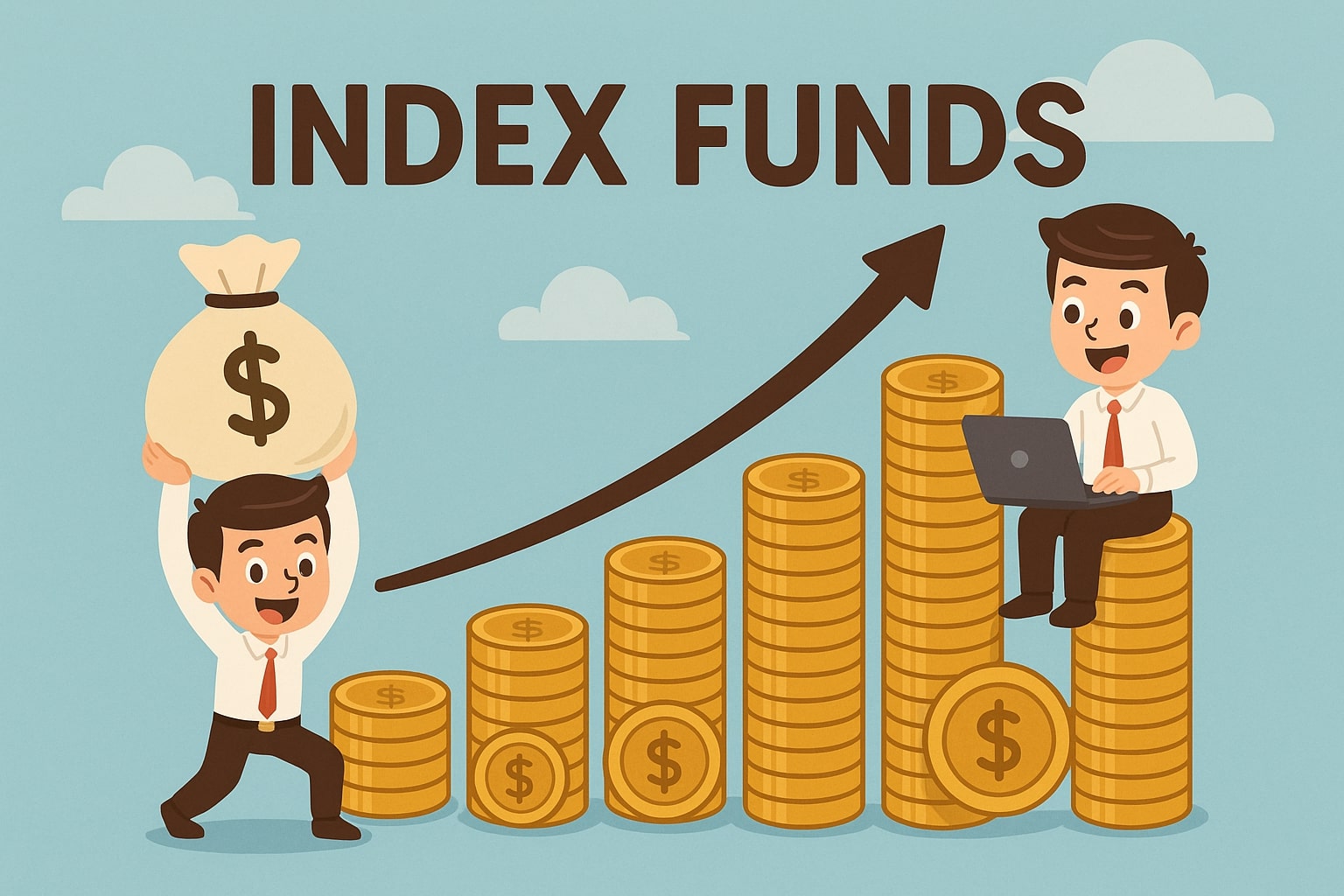
Diversification plays a big part in creating a solid investment portfolio. Spreading money into various assets such as equity, debt, real estate, and gold minimizes risk. Even in equity, investment in different sectors and sizes makes a big difference.
Index funds make it simple and efficient. They enable investors to own a wide portfolio of stocks in a single, straightforward way. Many ask, what are the index funds in India, since these funds have gained popularity in India, offering an affordable method of investing in the overall growth of the market. Let us look at what index funds are and more about them in detail.
About Index Funds
Index funds are exchange-traded funds or mutual funds that intend to match the performance of a particular index. Managers do not select stocks in actively managed funds, but index funds follow a passive strategy. For instance, a Nifty 50 index fund invests in all 50 constituent companies in proportion to their market capitalisation.
Such a strategy maintains management fees at low levels and minimizes the possibility of human errors. Index funds are well-liked for creating long-term wealth because they are simple and cost less. However, returns are based on overall market fluctuations and small variations referred to as tracking errors between the fund’s performance and the index it tracks. Understanding what are the index funds in India helps investors see why these funds remain a popular and easy choice for those seeking steady growth.
Types of Index Funds
- Broad Market Index Funds
Broad market index funds mimic a broader market segment. A few of these examples include the Nifty 100 and Nifty 500-based funds. These funds give broad sector exposure to a large basket of stocks, offering exposure to the broad market.
- Market Capitalization Index Funds
These funds are invested in the shares of companies by market capitalization. It can be small-cap, mid-cap, and large-cap. This diversification among stocks aids investors in diversifying their portfolios by the size of companies.
- Equal Weight Index Funds
Unlike ordinary funds, where stocks possess varying weights, an equal-weight index provides the same weight to every stock. For instance, an equal-weight Nifty 50 fund provides the same weight of 2% to each one of the 50 stocks, keeping the weightage of all companies uniform.
- Sector-Based Index Funds
Sector-based index funds specialize in stocks of particular industries. Common examples include funds following indices such as Nifty Bank, Nifty PSU, Nifty Technology, and Nifty Healthcare so that investors can make investments in specific sectors.
- International Index Funds
International index funds replicate foreign market indices. These funds are suitable for investors seeking global diversification beyond the Indian market.
Benefits of Index Funds
- Diverse Investment Choices
Index funds invest their money in firms of various industries and sectors. This diversification minimizes the risk and forms a diversified portfolio.
- No Special Investment Skill Required
These funds merely replicate an index’s performance, and you don’t require special expertise about the market or investing to begin with them.
- Cost Effectiveness
Lower management charges make index funds less expensive than actively managed funds. Their passive strategy keeps expenses low, and they save money in the long run.
- Time Savings
Because index funds replicate an index automatically, you don’t need to constantly monitor or make investment decisions, giving you more time.
- Streamlined Management
Investment management becomes simple with index funds because they need little adjustment or active management, which keeps you on track easily.
Who Should Invest in an Index Fund?
Index funds are perfect for investors who want to generate wealth over the long term with little effort. They are suitable for different kidneys of investors who want an easy and efficient means to accumulate wealth.
- New Investors
First-time investors who are stepping into investing use index funds. They have low risk since they are not stocks, so they are a good place to start.
- Low-Cost Investors
Index funds cost less than actively managed funds. These funds are an affordable choice for investors seeking to reduce fees.
- Diversification Seekers
Investors who need diversification immediately can depend on index funds. As they track broad market indices, they diversify investments in many sectors and companies, minimizing risk.
- Passive Investors
For individuals who like a “set-it-and-forget-it” approach, index funds provide a hands-off option. They eliminate the need for constant portfolio monitoring or rebalancing, making investment management simpler and less time-consuming.
Index Funds vs. Actively Managed Funds
| Feature | Index Funds | Actively Managed Funds |
| Investment Approach | Passively managed to replicate the performance of a market index | Actively managed to beat the market |
| Fees And Expenses | Low | High (due to research and trading) |
| Performance | Seek to match market and returns | Aim to beat market returns, which may not happen consistently |
| Taxes | Low turnover means low capital gains distributions and greater tax efficiency | High turnover leads to more taxable capital gains distribution |
| Risk | Carry as much risk as the overall market they track | May have higher or lower volatility depending on fund manager’s choices |
| Summary | Offer broad market exposure at lower costs but no chance to outperform | Potential to beat the market, but with higher expenses and greater tax liability |
How are Index Funds Taxed?
Index funds are considered equity funds for taxation purposes. Income distribution cum capital withdrawal (IDCW) from index funds is included in your taxable income and taxed based on your income tax slab.
Short-Term Capital Gains (STCG) arise if you redeem units within 12 months from the date of investment. STCGs are taxed at 15% plus cess and application surcharge.
Long-Term Capital Gains (LTCG) occur when you redeem units after a period of 12 months or longer. LTCG is charged at 10% along with cess and surcharge but gains up to rs. 1 lakh are exempt from tax in equity-oriented funds such as index funds.
Final Words
Index funds provide an easy and inexpensive means of investing in the market with wide diversification and reduced risk. Their passive nature keeps management costs low and allows less emphasis on continually monitoring the assets. An index fund is best suited for new investors, budget-conscious individuals, and those who do not want to be actively involved in the investment process.
Index funds yield consistent growth tied to market performance. Though they may not outperform actively managed funds, their transparency and tax efficiency make them a great option. In general, index funds represent a smart, accessible investment strategy for creating an adequately diversified portfolio over the long term.
Also Read : How Mutual Funds Are Taxed | How to Build a Mutual Fund Portfolio for Beginners
FAQs
1. What is an index fund, and how does it work?
Index funds copy a market index by investing in the same assets with similar weights to track performance.
2. What are index funds for beginners?
An index fund tracks a group of assets like stocks or bonds, representing a market index such as the S&P 500.
3. Are index funds a good investment?
Index funds offer low costs and taxes but don’t usually outperform the overall market significantly.
4. Is there any risk in index funds?
Index funds carry risks similar to those tracked by the market and may lack flexibility.
5. Are index funds free to invest in?
Index funds charge low fees, typically between 0.04% and 0.25%.
Reference
https://groww.in/mutual-funds/other-schemes/index-funds
https://hdfcsky.com/sky-learn/mutual-fund/what-is-index-fund
https://mutualfund.adityabirlacapital.com/blog/what-is-an-index-funds
https://www.axisbank.com/progress-with-us-articles/investment/mutual-fund/index-fund
Hello there, my name is Phulutu, and I am the Head Content Developer at Nivesh Karlo. I have 13 years of experience working in fintech companies. I have worked as a freelance writer. I love writing about personal finance, investments, mutual funds, and stocks. All the articles I write are based on thorough research and analysis. However, it is highly recommended to note that neither Nivesh Karlo nor I recommend any investment without proper research, and to read all the documents carefully.






Leave a Reply